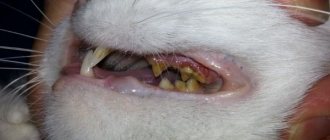12643Administration
2
The cause of death for cats can be serious illness, injury, old age, or an accident. Anticipating an imminent end, the animal often leaves its home, never to return. It is natural that the question arises why cats leave home to die. After all, even if the pet does not have the opportunity to leave the apartment, it simply hides in an inaccessible place, for example, somewhere in a closet.
There is no clear answer as to why this happens. There are several versions of this pattern, none of them have been scientifically confirmed.
Before my last breath
Like all living things on earth, the age of the animals living in your home is a determining factor. They can die at an early stage, but the likelihood of death in older animals is much higher. This applies to cats, which, as a rule, live up to 16-17 years. There are extraordinary cases when cats live up to 25 years or even more, but this happens very rarely. If your furry pet has been living with you for more than 14 years, then it is quite possible that he will soon pass away.
And this is quite natural, since biological laws apply to everyone. The old cat becomes weak, there is much less former joy in his life: the old cat will not play and frolic like a little kitten. At the same time, there is no need to torment and reproach yourself: your pet has lived its life and the time has come for its departure to another world. You must understand that this is quite natural, although sad.
Symptoms of death
Anticipating its demise, the cat is very attached to its owner and spends even more time with him. Even weak cats that have led a phlegmatic lifestyle throughout their lives change their behavior to the opposite at the end of their existence. There are cases when old, exhausted cats, barely moving, find the last strength to play with their owner. Why this happens remains to be fully understood, but this is one of the signs that you won’t be together for long.
However, this behavior does not happen in all cases. If a cat suffers from cancer or another incurable disease, its death is usually sudden. Often, cats dying at home, first of all, try to hide their condition from their owners and huddle in a secluded place.
Often the time of death is visible in advance:
- cats also wear out their bodies and by old age acquire a trail of various chronic diseases;
- when an animal realizes that its days are numbered, it becomes apathetic and sleeps almost constantly, rarely leaving its favorite place;
- eats very little and, because of this, quickly loses weight;
- the animal shows dissatisfaction or does not react at all when it is petted or picked up;
- begins to lose orientation and at home, while walking, touches objects, corners and bumps into them;
- the animal's breathing becomes heavy, the pupils are dilated and clouding of the lens of the eye is observed.
Proper owner behavior
What to do if it becomes clear that the cat is dying? Should I make a decision to euthanize her or leave everything as it is? To understand this, you should take an impartial look at the situation that has arisen. No matter how hard the owners try to surround the old cat with special care, affection and attention, they often only prolong their suffering. Nothing can save your furry pet from suffering; it is impossible to help in this situation.
The answer to this question depends on the condition of the animal. If it is healthy, it is not tormented by any pain or illness, then, of course, it should live out its life in peace and care. It’s another matter if the pet suffers or is overcome by a chronic disease. In this case, you should consult your veterinarian about euthanasia. In this case, you should not make a decision on your own.
How to care for your pet to ease its suffering
Cats who are about to die need special treatment
If you sense that your cat is getting ready to leave, give it your full attention. The animal may hint that it needs affection (walking into your arms, purring, being caressed, etc.). Some owners, realizing that their furry friend is about to pass away, take time off from work and put off everything. A cat, like a person, will be much calmer if its beloved owner devotes several hours to it and sees it off on its last journey.
Actually, caring for a cat depends on the circumstances. If your pet is sick, a diagnosis has been made, and any medications are being taken, a veterinarian can give advice. For example, increase the dose of painkiller, put on an IV, etc. But most often, the cat still needs moral support. Some believe that such care is needed not for the cat at all, but for its owner, in order to calm his conscience and not feel any guilt later.
Why do pets leave home and where?
Fiction often describes cases of dying cats leaving home on the eve of their death. And in fact, this phenomenon is widespread. Why do cats leave home to die? There are many theories about this. One of them claims that the animal does not want to cause psychological trauma to its owners.
Another group of scientists offers a different explanation for this behavior. They suggested that cats consider their condition to be a disease that will go away if they lie down in a quiet and secluded place. They hide from everyone and wait for the pain to subside. But in the end, they die alone, never waiting for the pain to go away.
However, there are many known cases when old cats literally said goodbye to their owners, climbing into their arms, and then leaving their home forever. It may very well be that cats really understand that their lives have come to an end. But why don't all cats leave home before they die? If a cat did not leave the house before dying, it means she had good reasons for this: a serious illness, she had never been taken outside before, senile weakness.
Signs and superstitions
In England it is considered a very bad omen if a cat dies in the house. By leaving, the pet brings disaster to its inhabitants. And if a cat jumped over a coffin with the body of a deceased person, then it had to be killed, otherwise misfortune could not be avoided. Although this nation has always been distrustful of representatives of the cat family, endowing them with witchcraft abilities and mystical properties.
There was a completely different attitude towards cats in Ancient Egypt, where they were revered and elevated to the rank of sacred animals. If a pet died, the owners shaved their eyebrows, cut off their hair and observed mourning for 70 days.
We believed that if cats leave home to die, they take all the bad energy with them, as if protecting their owners. It is believed that when an animal dies, it gives its beloved friend one of nine lives . For example, it can sense if a person is in mortal danger. The cat deliberately throws itself under the wheels of a car and dies, as if giving its life in return. It’s also not for nothing that the cat is the first to be let into the house at housewarming parties. After all, spirits live in every room, and only this fluffy and affectionate animal can calm them down.
And when all the cats die suddenly one after another throughout the year, this is due to an excess of negativity that furry creatures cannot cope with. This could be due to:
- otherworldly forces;
- damage or evil eye;
- unfavorable location of the house (for example, at the site of burials or mass deaths).
It is advisable to call a priest to consecrate your home and cleanse yourself of black thoughts. People who are skeptical about mystical events believe that cats die due to the presence of an infection in the house that is dangerous for them.
The kitten's last journey
Unfortunately, not only old and frail cats die, but also very small kittens. When you are waiting for the birth of kittens, you must prepare for the fact that some babies will not live. The most dangerous period for a newborn kitten is the first two weeks of its life. The condition that a baby experiences before death is called fading kitten syndrome. When a kitten dies, most often nothing can be done, but sometimes, if timely measures are taken, it can be saved.
Below are the main reasons why kittens die:
- Hypothermia or hypothermia.
- Incompatibility of blood between kitten and mother.
- Hypoglycemia or low blood sugar.
- Dehydration or dehydration.
- Reasons related to difficult childbirth and mother.
- The first birth of a young and inexperienced cat.
- Anomalies and defects in newborn kittens associated with cat obesity.
- The kitten is underweight.
- Unsuitable conditions for the development of a kitten.
- Improper cat nutrition.
- Infectious diseases (viral, bacterial, parasitic).
Small kittens die suddenly or slowly, within 5-10 days, fade away. The signs of a large number of diseases in newborn kittens are very similar. Healthy kittens always huddle together and sleep quietly between feedings. You can understand their imminent death by their anxiety. Sick babies often lie down separately, they are not calm, they suck poorly, they squeak pitifully, asking people for help.
Outwardly, the kitten, doomed to death, looks unkempt, its fur is not smoothed, it moves swaying and trembling. Unlike adult cats, kittens never leave home and most often remain in the nest until their last breath. They also often die next to their mother or person.
Euthanize a dying cat or let it die on its own
Special drugs are used for euthanasia
The decision to euthanize an animal is one of the most difficult. To decide to euthanize your beloved pet, you need to look at the situation from the outside. Even if a dying cat were offered royal terms, she could still die. And sometimes it is no longer possible to look at this suffering, and the most humane way to relieve a cat from suffering seems to be killing.
And even if a person clearly understands that pity for a cat is stronger than the reluctance to part with it, it is extremely difficult to decide on such a step. It's always hard to part with a friend about whom there are so many vivid memories. And how much joy he brought when he was little. The pranks once committed by a cat no longer seem like a universal catastrophe, but a trifle. Therefore, after thinking it over again, you need to consult a veterinarian. It is easier for a stranger to soberly assess the situation.
If the decision is made, you need to choose a method of euthanasia:
- The cat is given anesthesia, and after switching off, a drug is given that stops the heart or respiratory activity.
- An injection of ditilin (listenone), a drug that stops the functioning of the respiratory muscles, is given.
your pet will remain conscious until death. After the injection, the cat will begin to choke, will feel it, fight in agony, but will not be able to do anything about it. Euthanasia is carried out in a clinic or at home (for this, a veterinarian is called in advance). You also need to decide in advance what to do with the body (bury or cremate).
Video “When cats die”
This video shows images of cats and kittens doomed to death.
Was this article helpful?
Thank you for your opinion!
The article was useful. Please share the information with your friends.
Yes (100.00%)
No
X
Please write what is wrong and leave recommendations on the article
Cancel reply
Rate the benefit of the article: Rate the author ( 24 votes, average: 4.13 out of 5)
Discuss the article:
What to do after death and how to come to terms with loss
The cat can be buried in a special cemetery for animals or in the backyard (for example, in the country)
To survive a loss, you need to maintain some consistency. First you need to say goodbye to your pet's body. After the funeral, you can mourn the cat. Mourning an animal is useful, it makes it easier for a person to let go of a pet. After this, you need to remove objects that remind you of the cat: toys, bowl, tray, etc.
READ Cat food for urolithiasis
However, all this is just a dry instruction; the person himself must realize that life goes on, and that it is time to let go of his friend. Of course, the memories will still remain. But let these be bright and pleasant memories. After a couple of years, love and light sadness should remain in the memory, and not heavy depressing grief.
Often, to forget about the loss, people get a new kitten. This is a good way to shift attention, but it is not suitable for everyone. In each case, the death of a pet is experienced differently, so there cannot be a single recommendation. To survive this sad event, a person must go through all the stages of grief himself. The main thing is that there is no feeling of guilt. Everything else will be corrected by time, because it heals.
Signs of the imminent death of a purr
Cats age by 12–14 years, but some of them live up to 25 years, which is extremely rare. If your pet has reached old age, then you need to especially monitor its health and take care of it. Unfortunately, cats do not always die of old age. In any case, the signs described below can determine that death is approaching:
- Loss of appetite. First, the cat may refuse food, and then water. The following factors are dangerous:
- the animal does not eat throughout the day;
Refusal to eat is a sign of illness in your pet - the pet has not defecated for two or more days;
- excrement contains blood;
- urine darkened.
- Change in breathing. As an animal ages, its heart stops working normally, so less oxygen enters the lungs and blood than before. The cat quickly and heavily inhales air to replenish its losses. A healthy animal takes 20–30 breaths per minute. If there is shortness of breath and rare breathing, you need to be prepared for the imminent death of your pet. You can easily check the number of breaths by counting the number of times your cat's chest rises.
- Weak heartbeat and low blood pressure. It is not possible to measure blood pressure at home, since this requires special equipment, but you can call a veterinarian to your home. Normally, a cat's heart beats 122–140 beats per minute. If it is overloaded, it becomes more difficult for it to pump blood, which is why the normal indicator changes. Measure your pet's pulse like this:
- place your palm on the left side of the animal behind its front paw;
- count the number of beats within 15 seconds;
- multiply the resulting figure by 4 - you get the heart rate per minute;
- if in the end the number turns out to be less than 60, then the cat’s condition leaves much to be desired.
- Unpleasant smell. It appears due to a decrease in the body’s performance - toxins are not eliminated at all or this occurs partially. Their accumulation leads to the appearance of a specific odor emanating from the pet’s body and mouth.
- Low temperature (below 37.7 ⁰C). This means that the pet's heart has become weak. You can measure the temperature:
- a digital thermometer, inserting its tip into the cat’s rectum;
You can measure your temperature rectally - a special ear thermometer;
- folk method - if you don’t have any instruments, then touch the cat’s paw pads: cool pads are a sign of a decrease in temperature.
Many of these signs may indicate that your pet is sick. Therefore, do not rush to conclusions and visit a veterinarian.
My cat Vasya died as a teenager. We took him from a street cat - she lambed, the kittens had to be given away. The cat was very smart, a favorite of the whole family. We let him outside for a walk. And somehow he returned with a twisted jaw - he had a fight with someone. He couldn't eat - we fed him from a syringe. But this did not help - the veterinarian said that the cat would not survive.











